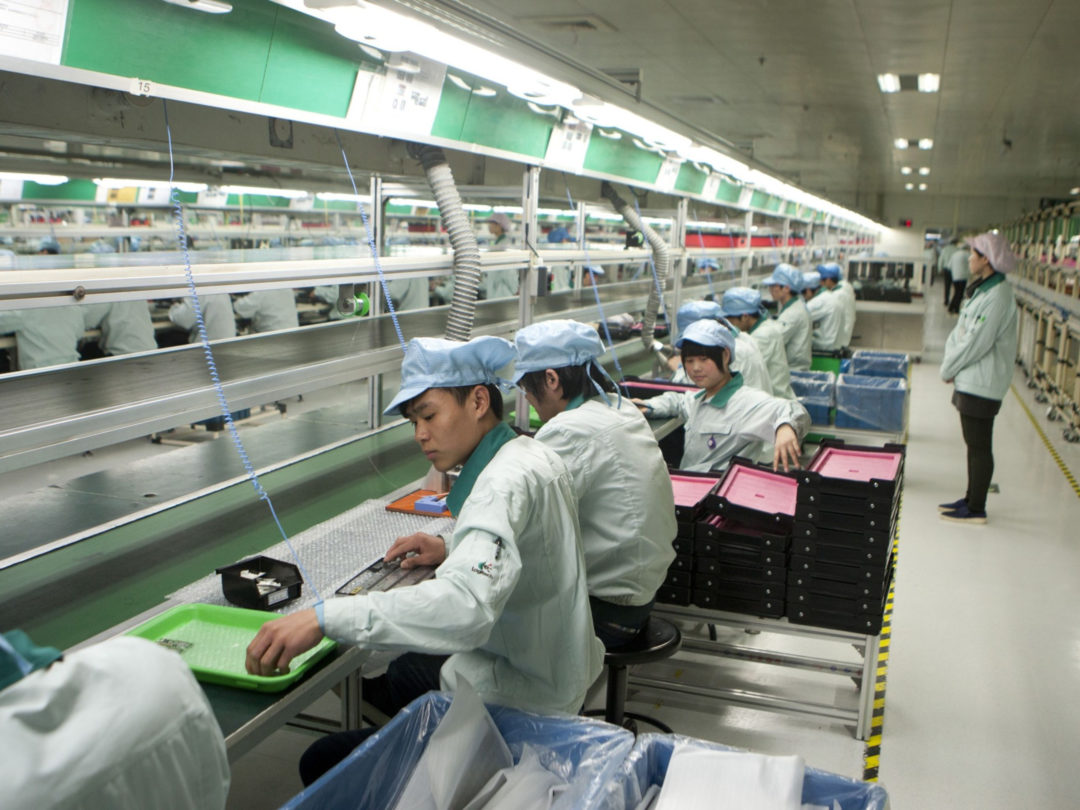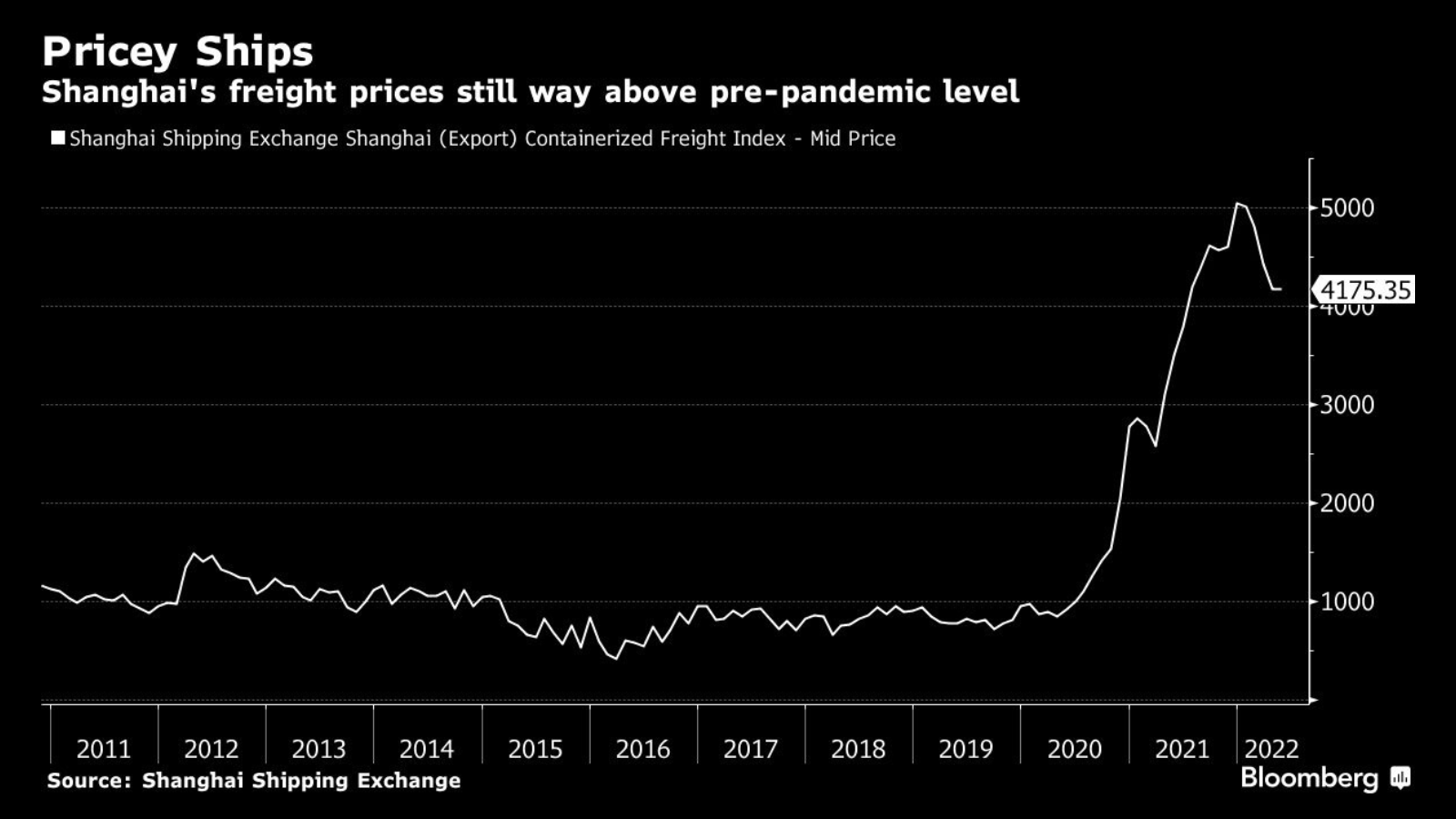
Home » China Export Boom Fades as Supply Chains Shift
China Export Boom Fades as Supply Chains Shift

June 9, 2022
After two years of record exports, Chinese manufacturers are turning downbeat as consumers in their biggest markets curb spending and Covid lockdowns drive customers to competitors in the region.
With most of the world now living with the coronavirus and travel and other leisure activities resuming, consumers are cutting back on spending on Chinese-made laptops, phones and other work-from-home goods that propelled the nation’s exports and fueled the economy’s recovery from its pandemic slump in 2020.
On top of that, soaring inflation in the U.S. and Europe means households are tightening their belts, while costs of raw materials and logistics remain excessive, eating into exporters’ profits.
Those are just some of the challenges that businesses like Shenzhen Teanabuds Electronics Co. have been grappling with. An exporter of wireless earbuds, headsets and speakers to the U.S., Europe and the Middle East, the company has seen orders plunge by about 50% compared with last year.
“They will only continue to decline in the rest of this year because we are losing our advantage,” said Zhang Wanli, the company’s global marketing director.
Some of Teanabuds’ clients have recently shifted their orders to Southeast Asian countries as suppliers there offered lower prices given their supply chains are less stressed, Zhang said. High raw material and shipping costs have narrowed the company’s profit margin to 15% from 30% in 2019, he said.

After surging 30% in 2021, exports are likely to grow just 1.6% this year, according to Nomura Holdings Inc. Exports accounted for more than a third of China’s growth last year and 20% in 2020, the bank estimates.
Trade will likely get a temporary boost as Shanghai reopens from its two-month long Covid lockdown — economists expect data Thursday to show exports grew 8% year-on-year in May, up from 3.9% in April. Still, the trend for the rest of the year is down.
“The export boom caused by Covid is behind us,” said Larry Hu, head of China economics at Macquarie Group Ltd.
Exports may contract this year in volume terms even if nominal growth could be positive due to price increases, said Thomas Gatley, a senior analyst at Gavekal Research Ltd. A drastic slowdown would put Beijing’s economic growth target of about 5.5% further out of reach.
“This is really not a good time for exports to weaken as well,” said Gatley. “This is why policy makers are increasingly panicking.”
Even though global consumers remain cashed up, fading government fiscal support and rising interest rates are impacting their disposable income. And with shoppers pivoting their spending back to services from goods, demand is sliding.
Vice Commerce Minister Wang Shouwen also acknowledged the pressures facing China’s trade, saying Wednesday that “we must be soberly aware that there are still a series of uncertainties in foreign trade.” A fragile global economic recovery, high inflation internationally, and logistics bottlenecks within China all cause uncertainties for the trade outlook for the rest of the year, he said at a press conference in Beijing.
Major U.S. retailers like Walmart Inc. and Target Corp. are also sitting on inventories of $45 billion, up 26% from a year ago, which they bulked up during the pandemic to overcome shipping delays. That means they’re under no pressure to place new orders.
Guangzhou GL Supply Chain Co., which makes everything from gardening products like watering cans and table cloths to Christmas-themed storage bags, says orders from U.S. and European customers have declined by half from the same period last year.
Even products for the Christmas season are selling poorly compared with 2021, “perhaps because people have to spend more money on basic necessities” because of higher inflation, said Chen Zijian, the sales manager.
“Last year, the pandemic was more serious,” he said. “But we sold gardening products, and the business wasn’t impacted much, perhaps because people stayed at home and gardened.” Compared with last year, “our orders have declined quite a lot,” he said.
Losing Out
More broadly, analysts say that a shift in supply chains for cheaper manufacturing in Southeast Asia is accelerating after a brief pause in the past two years. About 7% of Chinese orders for furniture were lost to countries like Vietnam between September 2021 and March 2022, as well as 5% for textile products and 2% for electronics, according to an estimate by Everbright Securities Co.
That challenge is being compounded by elevated raw material prices and freight rates. The raw materials subindex under China’s producer price index surged 17.4% in April, keeping costs elevated. The Shanghai containerized freight index is still at over four times pre-pandemic levels despite a retreat of 17% so far this year.
Even those exporters that are doing well are worried about what’s ahead as the Federal Reserve and other central banks raise interest rates.
Hermann Zhai, general manager of Shandong-based Kinghike Vehicle Co., which exports electric golf carts to the U.S., is enjoying a surge in orders thanks to more clients switching to electric instead of gasoline-powered carts in the face of skyrocketing energy prices.
“I hope the measures the Fed is taking will be effective to contain inflation,” Zhai said. “If it worsens and becomes hyperinflation, that could damage our sales significantly.”
RELATED CONTENT
RELATED VIDEOS
Subscribe to our Daily Newsletter!
Timely, incisive articles delivered directly to your inbox.
Popular Stories

2024 Supply Chain Management Resource Guide: There's Only One Way Off a Burning Platform
VIEW THE LATEST ISSUECase Studies
-
Recycled Tagging Fasteners: Small Changes Make a Big Impact
-

Enhancing High-Value Electronics Shipment Security with Tive's Real-Time Tracking
-

Moving Robots Site-to-Site
-
JLL Finds Perfect Warehouse Location, Leading to $15M Grant for Startup
-
Robots Speed Fulfillment to Help Apparel Company Scale for Growth



